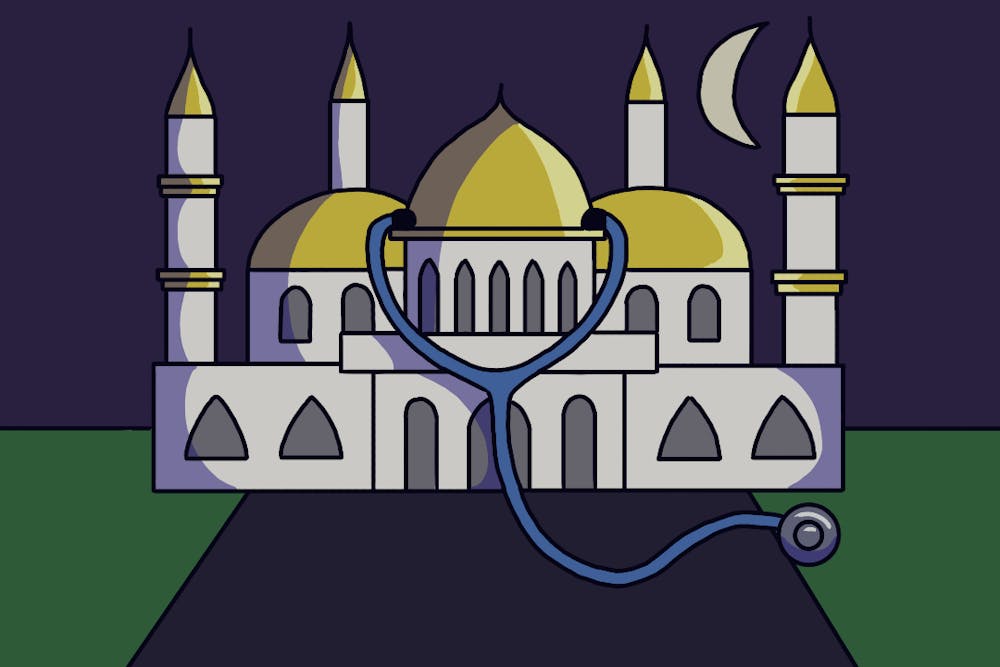ASU has welcomed a new organization dedicated to supporting Muslim students pursuing careers in medicine. Muslims in Medicine at ASU, founded by first-year students, aims to provide a strong academic and faith-based support network for aspiring healthcare professionals.
The idea for Muslims in Medicine emerged from the shared experiences of its founders, who recognized a gap in resources tailored to Muslim students interested in healthcare.
"As we advance within our pre-med routes, it gets quite lonely," says Maryam Cheema, a freshman biological sciences student and the club's president. "We hope to build a supportive community that addresses both professional and faithful needs."
Vice President Raheemah Gheyasi, a freshman computer systems engineering student, noted the lack of representation.
"There were a lot of other clubs in regards to medicine for other groups ... but there was nothing for Muslims. And so, we decided to initiate that change," Gheyasi said.
Public relations officer and freshman biological sciences student Arsh Khan emphasized the club's role as a hub not only for Muslim students in medicine but also for those interested in learning about Islam.
"Muslims in Medicine allows for another piece of diversity at ASU that individuals can seek out and learn more about," Khan said.
The club has already begun implementing initiatives to support students. Cheema said the organization has a new academic chair to tutor students in the pre-requisite classes for medical school. Cheema explained that Muslims in Medicine plans to host study sessions and provide MCAT preparation as well.
One of the club's first major events is going to be a collaborative simulation lab with the University of Arizona.
"We do plan on doing a simulation lab, which helps enhance our work, our skills and critical thinking," Cheema said.
Treasurer Ubah Abdi, also a freshman biological sciences student, stressed the importance of mentorship.
"We plan on providing mentorship, professional development and networking opportunities, as well as a space to discuss challenges," Abdi said.
The club is committed to engaging with the broader ASU community. Gheyasi and Cheema said they have plans to host collaborative panel discussions and trainings with the Muslim Student's Association.
Non-Muslim students are also encouraged to participate. As the club grows, its founders hope to expand its reach.
"All of us are actually encouraging individuals who are non-Muslim to come," Khan said. "We hope to see in the next couple years or so, especially when we're in our senior years, is to hopefully have individuals from all across ASU."
The founders of the club shared both their inspirations and their concerns about representations of Muslims working in healthcare. Gheyasi drew personal inspiration for the club from Islam's emphasis on saving lives.
"Doctors, nurses, anyone who's really in the medical field in war-torn countries. I feel like they're one of my biggest inspirations like how we saw in Gaza," Gheyasi said.
Cheema said her motivation for founding the club came from witnessing the struggles faced by visibly Muslim women.
"Hijabis are definitely treated a little bit different, especially when put in actual positions with the public," Cheema said.
The founders of the club wanted to provide a space where incoming pre-med students didn't feel isolated. Based on their experiences in their first year, they had some advice for students considering the pre-med track. Khan stressed the importance of resilience for incoming students.
"It's going to be a lot, but ultimately you chose this path. You knew that was going to be a lot, so don't put yourself down and just keep going," Khan said.
Khan said their plans for the future include elaborate events and increased funding.
"We really want to ... try to make sure that individuals who respect our club also respect Islam and the individuals who respect Islam respect healthcare just as much as we do," Khan said.
As its founders navigate their own journeys in medicine, they hope to pave the way for future students, ensuring that no one feels alone in their pursuit of a medical career intertwined with faith.
Edited by Sophia Ramirez, Abigail Beck, Tiya Talwar and Natalia Jarrett.
Reach the reporter at ammaarzindani@asu.edu.
Like The State Press on Facebook and follow @statepress on X.




